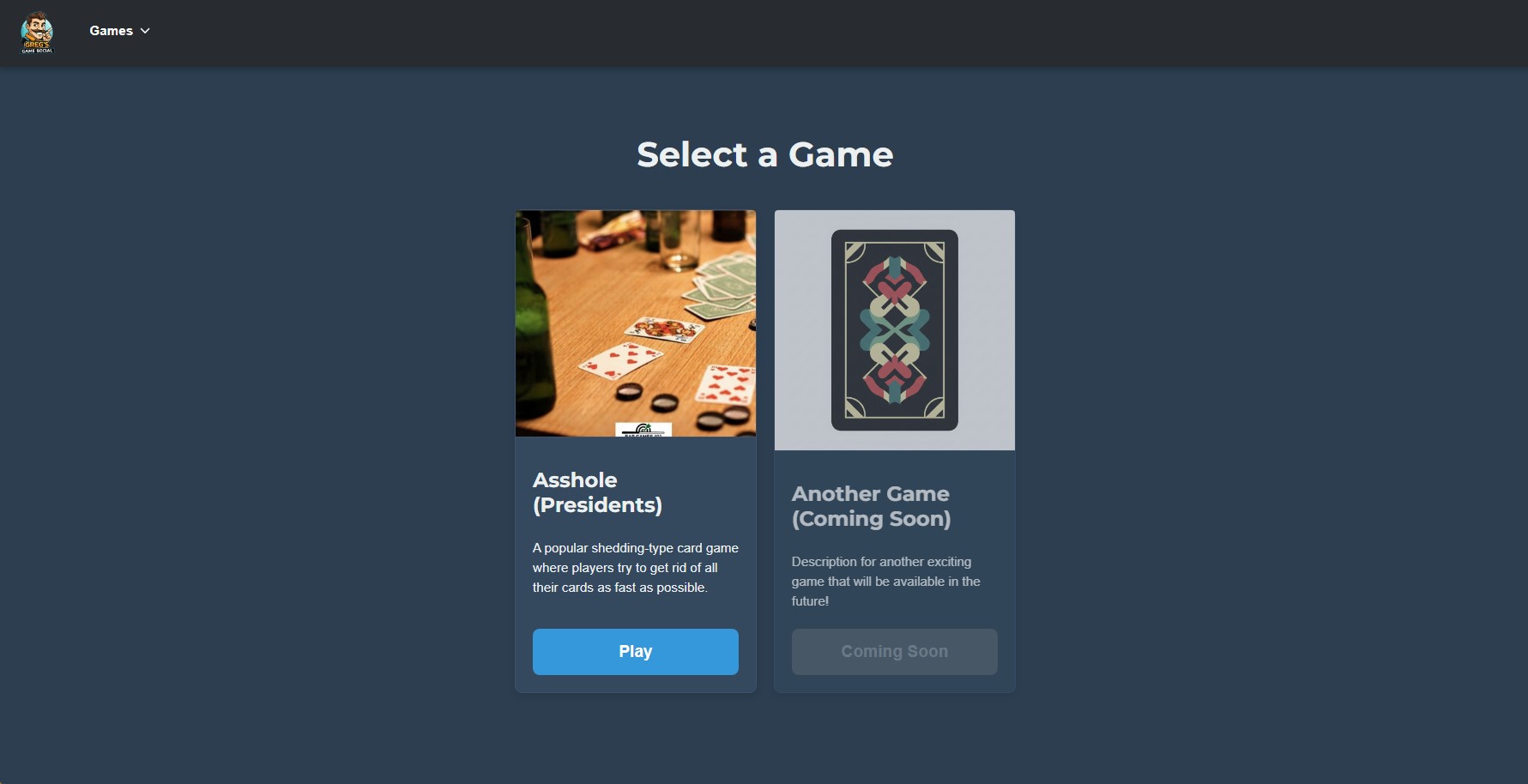Card Game Engine
SITUATION:
My initial objective was to develop a robust card game engine, specifically focusing on the game of "Asshole (Presidents)." Once the core game logic and rules were established within this engine, the subsequent challenge was to integrate it into a comprehensive full-stack web application. This required designing a scalable API layer to expose game functionalities and building an intuitive frontend UI to allow users to interact with the game engine, all while ensuring seamless deployment on cloud infrastructure.
TASK:
My primary task evolved to seamlessly integrate the developed card game engine into a scalable full-stack architecture. This involved:
- Exposing the game engine's functionality via a Python Flask API, containerized for consistent deployment.
- Developing a responsive React frontend to manage game lobbies, display game state, and interact with the API.
- Establishing automated CI/CD pipelines for both the frontend (AWS Amplify Hosting) and the backend (AWS App Runner) from separate GitHub repositories.
- Meticulously troubleshooting complex deployment, environment variable injection, and cross-origin resource sharing (CORS) issues to ensure robust inter-service communication in the cloud environment.
ACTION:
- Application Development: Designed and built the interactive React frontend for game lobbies and user interfaces, and developed a Flask API backend to manage game rooms and API requests, containerizing it with Docker.
- Initial Cloud Deployment: Configured separate GitHub repositories for the frontend and backend, integrating them with AWS Amplify Hosting for automatic frontend deployments and AWS App Runner for automated backend deployments via Docker image builds.
- Dependency & Build Environment Resolution: Addressed initial
npm create amplifysetup issues, includingERESOLVEpeer dependency conflicts, by employing--forceand--legacy-peer-depsfor robust package installation. - Backend Deployment Troubleshooting: Systematically debugged App Runner build failures, identifying and correcting case-sensitivity issues in
requirements.txtand ensuring theDockerfilecorrectly configuredgunicornto serve the Flask application. - Critical Frontend-Backend Communication Diagnosis: Faced persistent
net::ERR_CONNECTION_REFUSEDerrors tohttp://127.0.0.1:5000on the deployed frontend.- Utilized
amplify.ymlbuild logs andconsole.logstatements in the React application to confirmREACT_APP_API_BASE_URLwas not being correctly injected as an environment variable during the frontend build. - Identified a crucial hardcoded
http://127.0.0.1:5000URL in a specific frontendfetchcall, which was bypassing the environment variable entirely. - Implemented
echo "REACT_APP_TEST_VARIABLE=$REACT_APP_TEST_VARIABLE" >> .envdirectly withinamplify.ymlto force environment variable injection for the React build process. - Executed aggressive cache-clearing and forced redeployments on Amplify Hosting to ensure the updated code was served.
- Utilized
- CORS Policy Resolution: After establishing initial communication, encountered
CORS policy blockederrors (NoAccess-Control-Allow-Originheader).- Analyzed browser console logs to pinpoint the exact
Origin(https://play.gregsgames.social) andResource(https://api.gregsgames.social/rooms) mismatch. - Corrected the Flask backend's
frontend_originslist inapi.pyby meticulously removing incorrect backend URLs, eliminating trailing slashes from valid frontend origins, and ensuringhttp://localhost:3000, Amplify's default domain, and the custom frontend domain were precisely listed. - Triggered a new App Runner deployment for the backend to apply the CORS configuration changes.
- Analyzed browser console logs to pinpoint the exact
RESULT:
Successfully deployed a fully operational full-stack web application, Greg's Games Social, with the "Asshole (Presidents)" card game engine at its core, featuring a React frontend communicating seamlessly with a Flask API backend. This project significantly enhanced my skills in designing game logic, cloud deployment (AWS Amplify, AWS App Runner), containerization (Docker), and advanced troubleshooting of inter-service communication issues, including environment variable injection and complex CORS configurations. I established robust and automated CI/CD pipelines, demonstrating the ability to take a project from initial game engine development to a production-ready, scalable solution.
Project Details
This project involved building and deploying a scalable, real-time-ready full-stack web application, featuring a React-based frontend and a containerized Python Flask API backend. The infrastructure leverages cutting-edge AWS services for modern cloud deployment and continuous delivery.
Overview & Goal
The primary goal was to create an interactive social gaming platform capable of managing game lobbies and serving real-time game state, with the flexibility of a Python backend for complex game logic. This required integrating separate frontend and backend codebases, hosted and managed by AWS cloud services.
Key Technologies Used
- Frontend:
- React.js: Modern JavaScript library for building user interfaces.
- AWS Amplify Hosting: Fully managed platform for hosting modern web applications, providing CI/CD directly from GitHub.
- Backend:
- Python Flask: Lightweight web framework for building the API endpoints.
- Gunicorn: WSGI HTTP Server for Python web applications, used for serving Flask in production.
- Docker: Containerization platform for packaging the Flask application and its dependencies into a portable image.
- Backend Deployment & Infrastructure:
- AWS App Runner: Fully managed service for deploying containerized web applications directly from source code repositories, handling infrastructure, scaling, and load balancing automatically.
- AWS IAM: Managed user permissions and roles for secure access.
- AWS ECR (Elastic Container Registry): Used by App Runner to store the built Docker images.
- AWS API Gateway: (Implicitly used by App Runner for custom domains, or by Amplify for traditional API Gateway/Lambda setups, though App Runner provides its own default domain).
- Version Control & CI/CD:
- GitHub: Separate repositories for frontend and backend codebases.
- Automatic Deployments: Configured continuous integration/continuous deployment (CI/CD) pipelines via Amplify Hosting and App Runner for automatic redeployment on Git pushes.
Architectural Highlights
- Separated Frontend & Backend: Maintained distinct codebases and deployment pipelines for the React UI and the Flask API, promoting modularity and independent scaling.
- Containerized Backend: The Flask API was Dockerized, ensuring consistent environments from development to production and simplifying deployment onto container services like App Runner.
- Managed Serverless-like Backend: Leveraging AWS App Runner eliminated the need for manual server provisioning, patching, and scaling, allowing focus on application logic.
- Automated CI/CD: Integrated GitHub with Amplify Hosting and App Runner to enable automatic builds and deployments upon code commits to respective repositories, streamlining development workflow.
Key Challenges & Solutions
- Initial AWS Amplify CLI Setup (ERESOLVE errors): Encountered persistent
ERESOLVEpeer dependency conflicts duringnpm create amplify/ampx createdue toreact-scriptsandtypescriptincompatibilities.- Solution: Employed
npm install --forceandnpm install --legacy-peer-depsfor initial project setup and dependency management, ensuring a stable local environment.
- Solution: Employed
- AWS Amplify Gen 2 CLI (
ampx) Complexities: Initially navigated theampxCLI's "code-first" approach, encountering environment not found and IAMAccessDeniedExceptionissues.- Solution: Pivoted to a more direct and console-driven deployment of the backend using AWS App Runner, simplifying the CI/CD pipeline while retaining container benefits. Configured IAM policies to grant necessary SSM permissions for bootstrapping.
- Frontend-Backend Communication & Environment Variables: The React frontend was unable to connect to the deployed Flask API, falling back to a local URL.
- Root Cause 1: A hardcoded
http://127.0.0.1:5000URL in a specificfetchcall in the React frontend, bypassing the environment variable mechanism. - Root Cause 2: The
REACT_APP_API_BASE_URLenvironment variable was not being correctly injected into the React application's JavaScript bundle during the Amplify Hosting build process. - Solution 1: Modified the React frontend code to use the
api.jsutility andprocess.env.REACT_APP_API_BASE_URLfor all API calls. - Solution 2: Ensured correct configuration in Amplify Console (
REACT_APP_API_BASE_URLwith no trailing slash) and, as a robust measure, explicitly usedecho "REACT_APP_TEST_VARIABLE=$REACT_APP_TEST_VARIABLE" >> .envwithin theamplify.ymlbuild commands to guarantee injection into the build environment. Forced repeated, clean redeployments.
- Root Cause 1: A hardcoded
- Dockerfile & App Runner Build Failures: Initial App Runner deployments failed due to "Failed to execute 'build' command."
- Root Cause 1: Misspelling of
requirements.txt(e.g.,Requirements.txt) leading to case-sensitivity issues in the Linux-based App Runner build environment. - Root Cause 2: Confusion around App Runner's "Build command" vs.
Dockerfile'sCMDfor dependency installation. - Solution 1: Corrected the filename to
requirements.txtin the GitHub repository. - Solution 2: Ensured the
Dockerfile'sRUN pip installcommand was robust and correctly placed. Providedgunicorn ...as the explicit "Start command" in App Runner when required by the console, relying onDockerfile'sWORKDIRandCOPYinstructions.
- Root Cause 1: Misspelling of
- CORS Policy Blocking: After successful connection, the browser blocked requests due to a missing
Access-Control-Allow-Originheader.- Root Cause: The
frontend_originslist in the Flask backend'sCORSconfiguration was incorrect, including backend URLs and potentially misformatted frontend URLs (e.g., with trailing slashes, or usingos.environ.get('AMPLIFY_FRONTEND_URL')which resolves toNonein App Runner). - Solution: Precisely configured the
frontend_originslist in Flask to include only the exact URLs of the frontend deployments (Amplify Hosting URL, custom frontend domain,localhost), without trailing slashes.
- Root Cause: The
Outcome & Impact
Successfully launched a fully functional, cloud-deployed full-stack web application. The project demonstrates strong proficiency in:
- Modern web development (React, Flask, Docker).
- Cloud deployment strategies (AWS Amplify Hosting, AWS App Runner).
- Troubleshooting complex integration issues across frontend, backend, and cloud environments.
- Implementing robust CI/CD pipelines from GitHub.
This project provided invaluable experience in building and maintaining a scalable web application in a professional cloud setting.

